

Google's Plan To Fight Human Trafficking With Big Data. Google announced this week that it’s giving a $3 million Global Impact Award (part of a series of grants given to nonprofits changing the world with technology) to help three anti-trafficking organizations--Polaris Project, Liberty Asia, and La Strada International--create a Global Human Trafficking Hotline Network.

While these organizations operate effective trafficking hotlines across the world, they don’t share their information. That’s the kind of big-data problem that Google can help with. Britain leads dash to explore for oil in war-torn Somalia. Engineers and visitors tour an exploratory well in Somalia's semi-autonomous Puntland region.
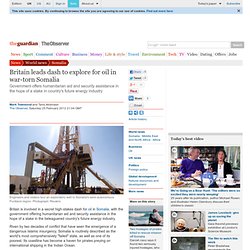
Photograph: Reuters Britain is involved in a secret high-stakes dash for oil in Somalia, with the government offering humanitarian aid and security assistance in the hope of a stake in the beleaguered country's future energy industry. Riven by two decades of conflict that have seen the emergence of a dangerous Islamic insurgency, Somalia is routinely described as the world's most comprehensively "failed" state, as well as one of its poorest. Its coastline has become a haven for pirates preying on international shipping in the Indian Ocean. David Cameron last week hosted an international conference on Somalia, pledging more aid, financial help and measures to tackle terrorism. British involvement in the future Somali oil industry would be a boon for the UK economy and comes at a time when the world is increasingly concerned about the actions of Iran, the second-biggest oil producer in Opec.
Greece on the breadline: the children of Athens too hungry to do PE. Residents in Athens carry bags of cheap potatoes bought directly from Greek farmers at cost price, one of the burgeoning ways to cope in the worsening financial crisis.
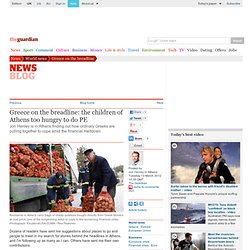
Photograph: KeystoneUSA-ZUMA / Rex Features. Achieving universal energy access. For decades, achieving universal energy access has been a key development goal.
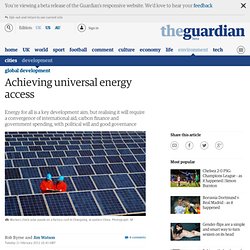
Once solved, the resolution of many other development challenges might follow: lighting, cooking, heating, cooling, mobility and communications. But the International Energy Agency's World Energy Outlook for 2011 estimates that 1.3 billion people across the world do not yet have access to electricity and 2.7 billion rely on traditional biomass for their energy needs.
If we continue as we are, according to a recent report from development NGO Practical Action, 900 million people will not have access to electricity in 2030 and 3 billion will still be cooking with traditional fuels. That means 900 million people will live without decent lighting in their homes, and many millions will die of avoidable, smoke-related diseases. In the run-up to the UN conference on sustainable development, Rio+20, achieving universal energy access remains a complex problem. Institute > How to Kill an Economy. We’re underestimating the risk of human extinction. US turns up heat on China solar subsidies. 22 February 2012Last updated at 16:02 By James Melik Reporter, Business Daily, BBC World Service China exports more than 90% of its solar energy products In the search for sustainable energy, the battle for the growing solar market could be set to trigger a trade war between China and the US.
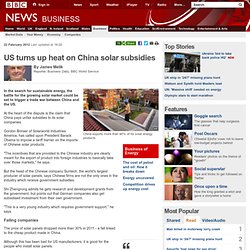
At the heart of the dispute is the claim that China pays unfair subsidies to its solar companies. Gordon Brinser of Solarworld Industries America, has called upon President Barack Obama to impose a tariff barrier on the imports of Chinese solar products. US challenges India poultry import ban at trade body. 7 March 2012Last updated at 07:06 The US authorities have accused India to trying to protect its domestic poultry industry The US has dragged India to the World Trade Organization challenging its ban on imports of American poultry.
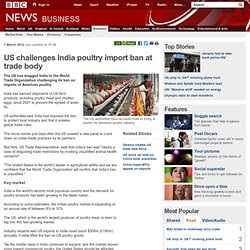
India has banned shipments of US farm products, including poultry meat and chicken eggs, since 2007 to prevent the spread of avian flu. US authorities said India had imposed the ban to protect local industry and that it violates global trade rules. The move comes just days after the US created a new panel to crack down on unfair trade practices by its partners. Ron Kirk, US Trade Representative, said that India's ban was "clearly a case of disguising trade restrictions by invoking unjustified animal health concerns". "The United States is the world's leader in agricultural safety and we are confident that the World Trade Organization will confirm that India's ban is unjustified.
" Key market. New Global Partnership On Development Cooperation Forged At Busan High Level Forum On Aid Effectiveness. By Elcano Royal Institute By Homi Kharas International development is in flux.
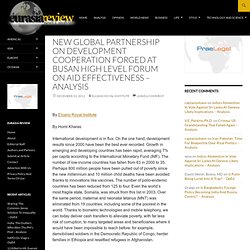
On the one hand, development results since 2000 have been the best ever recorded. Growth in emerging and developing countries has been rapid, averaging 7% per capita according to the International Monetary Fund (IMF). Journalist's concern over bird flu research. 17 February 2012Last updated at 01:25 By Pallab Ghosh Science correspondent, BBC News Research into the H5N1 virus has to be carried out in highly controlled conditions The editor of a leading scientific journal has said his "default position" is to publish full details of controversial research into the bird flu virus, unless progress is made on how to circulate details of the findings to scientists. The World Health Organization is expected to announce later its view of how to circulate the research safely to scientists studying the H5N1 virus in humans.
Rushanara Ali: Where's the International Leadership on International Development? Is protecting the environment incompatible with social justice? A Safe and Just Space for Humanity: Can we live within the doughnut? New EU-US organics partnership is good news for both sides of Atlantic. On Wednesday, the European Union and the United States announce a historic partnership to make it easier to trade in organic foods, opening up opportunities for organic farmers and ranchers, small businesses, and jobs in packaging, shipping, and marketing on both sides of the Atlantic.
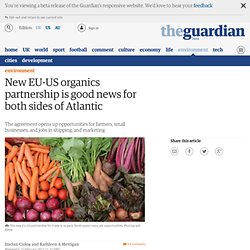
The new arrangement, which comes into force 1 June, allows products certified as organic in the EU to be sold in the US and vice versa, eliminating significant barriers for producers. At present, a separate, additional certification is required, meaning additional costs and bureaucracy for organic farmers. To help reduce paperwork and expenses, the arrangement is simple in its aim: it recognizes that the EU and the US have credible organic certification systems and that we share common perspectives about what constitutes the production of organic products. We also know that economic activity around the production, distribution, and sale of organic products packs a punch.
Busan has been an expression of shifting geopolitical realities. Some international conferences are immediate failures, but none are immediate successes.
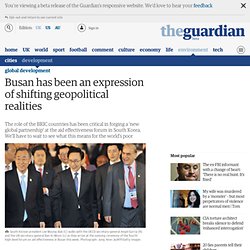
It will take weeks, months and ultimately years before the impact of the last few days at the Busan forum on aid effectiveness will be known, and it is impossible to find two people with the same opinion at the moment. Here is my preliminary view. If you think what matters are time-bound measurable commitments, then Busan is something of a failure. At Paris, most of the technical work on principles and indicators was already done, with a limited amount of target-setting left for after the conference. Negotiators reach consensus on global land governance guidelines. Negotiators in Rome have agreed on a proposed set of voluntary global guidelines on responsible governance of land tenure and access rights to land, fisheries and forest resources.
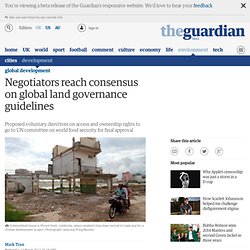
Air pollution 'will become bigger global killer than dirty water' Beijing, China, which is one of the countries likely to be worst hit by pollution-triggered deaths in coming decades. Photograph: David Gray/Reuters Urban air pollution is set to become the biggest environmental cause of premature death in the coming decades, overtaking even such mass killers as poor sanitation and a lack of clean drinking water, according to a new report. Britain leads dash to explore for oil in war-torn Somalia. Following House passage, mirror bill introduced into US Senate to block US airlines from participating in EU ETS on GreenAir Online. Thu 8 Dec 2011 – Following the adoption of the H.R. 2594 bill in the US House of Representatives late October, Senator John Thune has introduced a mirror bill in the Senate.
The bill instructs the US Secretary of Transportation to prohibit US civil aircraft operators from participating in what it describes as the EU’s unilaterally established scheme, similar language to that of H.R. 2594. The move was welcomed by trade body Airlines for America, formerly the Air Transport Association, who estimate the EU ETS will cost US airlines and passengers more than $3.1 billion between 2012 and 2020. The EU ETS issue is to be discussed at a regular meeting coincidentally being held today of EU and US representatives under the US-EU bilateral Open Skies air transport agreement. Winds of change blow through China as spending on renewable energy soars. OFC - UK Punching Above its Farming Weight. News OFC - UK Punching Above its Farming Weight. Verdict still out on whether Busan is a good deal for poor countries. Sainsbury's Outlines Commitment to British Farming. Poultry News. Eight Strategic Factors to Consider in 2012.
Rarely in the past six decades has global context counted for as much in strategic forecasting — trend analysis — as it does at the dawn of 2012. Reliance on stove-piped analysis of “strategic sectors” — such as economic and financial issues, security issues, politics, geopolitics, resources and energy, sociology and religion, and so on — will produce skewed and unreliable estimates, and will tend to favor linear extrapolations of recent experience.